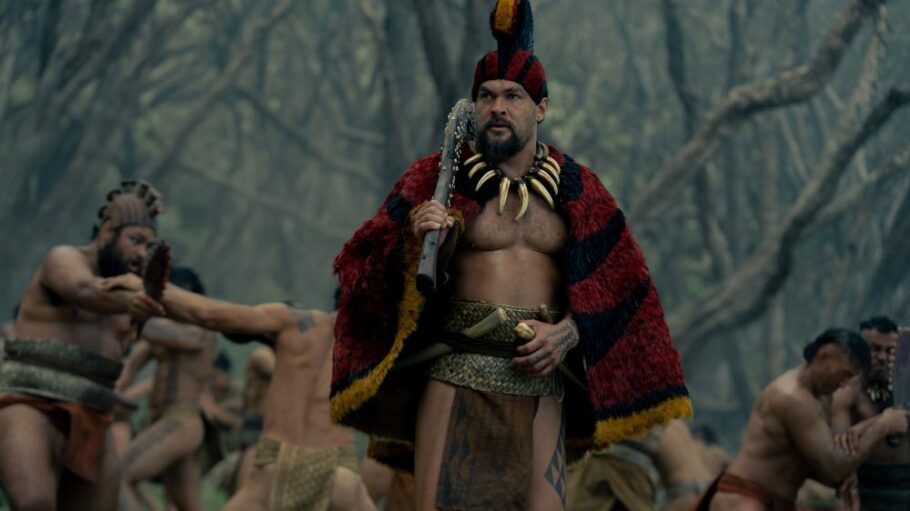In the West, we live on stolen land. The degradation and genocide of Indigenous Americans on the mainland is widely known. Yet, the settlement of the Hawaiian Islands is much less examined. Now, in Apple TV+‘s sweeping 18th-century war epic “Chief of War,” Jason Momoa and Thomas Pa’a Sibbett showcase the unification and colonization of Hawai’i, a nearly 30-year-long enterprise whose ramifications are still widely felt today. Stunning, historical and with acute attention to detail, this series is about the greed of men, a crushing power obsession and the brutality of war.
This story, which took a decade to bring to the small screen, begins with a prophecy. Long before Hawai’i became the unified state it is now, it consisted of four different kingdoms. O’ahu, Maui, Kaua’i and the big island of Hawai’i were all joined by water but divided by greedy men, cunning chiefs and a cycle of endless combat. However, a prophecy foretold of a great king who would come forth to unite all of the islands and end the needless fighting. As the show opens, the audience is introduced to Ka’iana (Momoa). The son of a great Maui warrior and a magnificent fighter in his own right, Ka’iana finds no solace in bloodshed.
Having fled Maui following yet another unjust battle and finding refuge in Hawai’i with his wife, Kupuohi (Te Ao o Hinepehinga), his brothers, Nahi’ (Siua Ikale’o) and Namake’ (Te Kohe Tuhaka), as well as his sister-in-law Heke (Mainei Kinimaka), Ka’iana has lost all interest in the politics of Maui. Unfortunately, his peaceful existence is short-lived when he’s summoned by Maui’s King Kahekili (Temuera Morrison) to serve in a battle against O’ahu. Blinded by his own ambitions, King Kahekili convinces Ka’iana, his son Prince Kūpule (Brandon Finn) and his war chiefs that O’ahu is a grave threat to Maui. Honoring their bloodline, Ka’iana and his family follow King Kahekili’s orders. Unfortunately, instead of fighting in defense of Maui, Ka’iana finds himself at the helm of a desecration of an empire, in a conflict he did not sign up for.
Devastated, Ka’iana abandons his post and is branded a traitor by King Kahekili. He also finds himself adrift, living outside of the Hawaiian Islands for the first time in his life. Under the guidance of his new friend, Tony (James Udom), Ka’iana begins to understand what’s at stake for his people under the reign of the increasingly treacherous and diabolical Kahekili. He also witnesses firsthand the horrific impact of colonizers, whom he calls paleskins. Unfortunately, convincing Hawai’i’s War Chief Kamehameha (Kaina Makua), who himself is at odds with the newly instated Hawai’i King Keōua (Cliff Curtis), to prepare for threats inside and outside of the islands may be too much to overcome.
“Chief of War’s” nine-episode first season is vast and full of traditions hardly seen before on television. Staying true to history, the majority of the story’s dialogue is in Hawaiian, a now critically endangered Polynesian language. As a result, audiences may struggle to find their footing in the series’ initial episodes. However, those willing to truly immerse themselves in this narrative will get a bird’s-eye view of the inner conflicts and histories of the Hawaiian islands. The show also provides a deeper understanding of the rot and greed of colonization, which sheds light on the current state of Hawai’i and its ongoing struggle for cultural survival.
While some episodes of “Chief of War” can feel overwhelming due to the numerous storylines and characters, Episode 5 (“The Race of the Gods”) is a standout. In the episode, Ka’iana must convince Kamehameha he’s worthy of joining his council by competing in a gravity-defying lava sledding competition. Not only does this particular episode center on the bonds of family, it puts a traditional Hawaiian sport on display while celebrating the sheer grit and tenacity of these warrior chiefs.
From the dialogue to the costuming and even the captivating visuals (including the water of the Pacific Ocean and the viciousness and brutality of the battles), “Chief of War” is highly textured and specific. The series highlights tensions among families, fractured loyalties and an ever-expanding outside world just waiting to encroach on land they have no ownership over. Like FX’s 17th-century drama “Shōgun,” “Chief of War” is a majestic and immersive story about rebels, home and allegiance.
Love Film & TV?
Get your daily dose of everything happening in music, film and TV in Australia and abroad.
The first two episodes of “Chief of War” premiere Aug. 1 on Apple TV+ with new episodes dropping weekly on Fridays.
From Variety US































